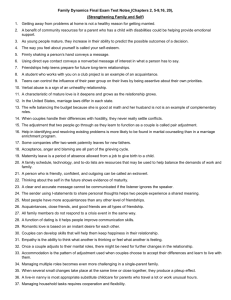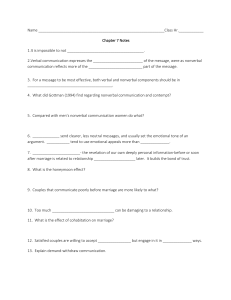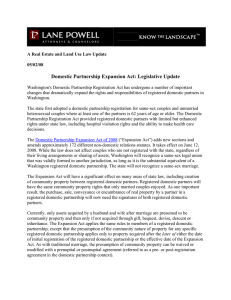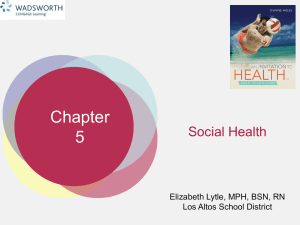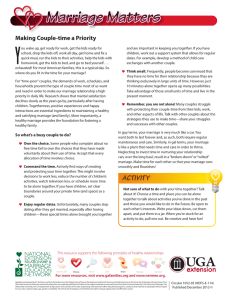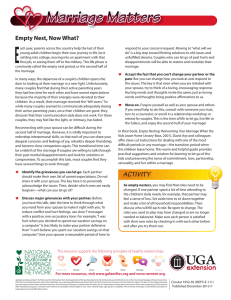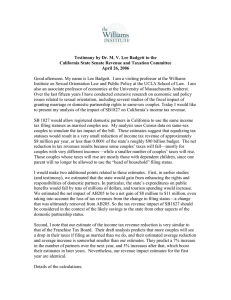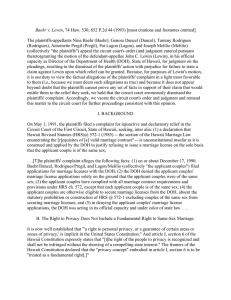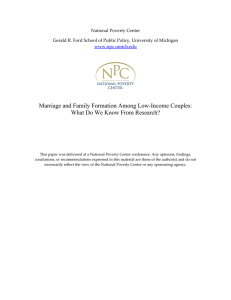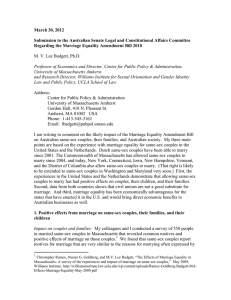Enhancing Relationships: Strengthening Commitment
advertisement
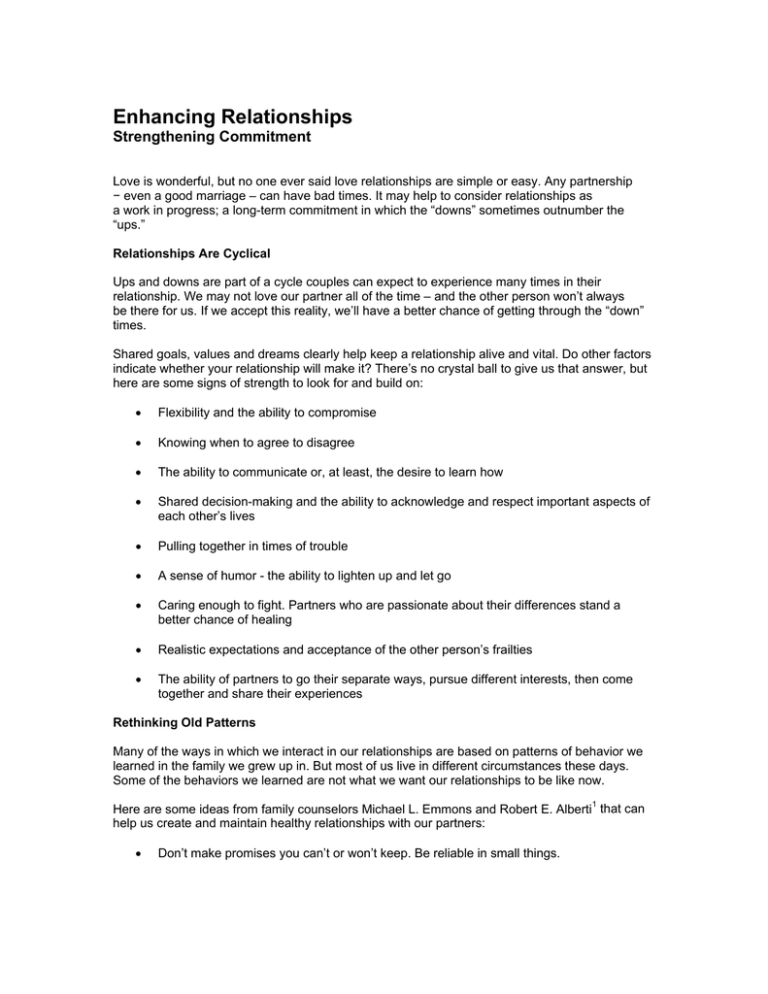
Enhancing Relationships Strengthening Commitment Love is wonderful, but no one ever said love relationships are simple or easy. Any partnership − even a good marriage – can have bad times. It may help to consider relationships as a work in progress; a long-term commitment in which the “downs” sometimes outnumber the “ups.” Relationships Are Cyclical Ups and downs are part of a cycle couples can expect to experience many times in their relationship. We may not love our partner all of the time – and the other person won’t always be there for us. If we accept this reality, we’ll have a better chance of getting through the “down” times. Shared goals, values and dreams clearly help keep a relationship alive and vital. Do other factors indicate whether your relationship will make it? There’s no crystal ball to give us that answer, but here are some signs of strength to look for and build on: Flexibility and the ability to compromise Knowing when to agree to disagree The ability to communicate or, at least, the desire to learn how Shared decision-making and the ability to acknowledge and respect important aspects of each other’s lives Pulling together in times of trouble A sense of humor - the ability to lighten up and let go Caring enough to fight. Partners who are passionate about their differences stand a better chance of healing Realistic expectations and acceptance of the other person’s frailties The ability of partners to go their separate ways, pursue different interests, then come together and share their experiences Rethinking Old Patterns Many of the ways in which we interact in our relationships are based on patterns of behavior we learned in the family we grew up in. But most of us live in different circumstances these days. Some of the behaviors we learned are not what we want our relationships to be like now. Here are some ideas from family counselors Michael L. Emmons and Robert E. Alberti1 that can help us create and maintain healthy relationships with our partners: Don’t make promises you can’t or won’t keep. Be reliable in small things. Keep short-term arguments in perspective. These will pass if they’re not blown out of proportion. Give thought to the purpose of your relationship. Be clear about what you want and the value of what you’re trying to achieve. Don’t assume the worst every time you have the same hassle. Many fights are triggered by similar events. Examine and try to change negative pattern interactions in your relationship. Re-pledge yourselves to each other aloud occasionally. Keep a journal and photo albums. Read about – or look at − the good times, when things get tough. Examine the key dimensions of your relationship. Look for ways to strengthen your attraction to each other, improve your communication, feel more trust, have more strength of purpose and enhance your enjoyment of each other. Help Your Marriage Survive a Crisis Research2 has shown that couples who strengthened or sustained their marriages during times of crisis used similar strategies: Keep a realistic perspective of the crisis. This keeps the effects from spreading to other areas of your lives. Avoid blame. Don’t waste energy blaming and criticizing. It distracts you from focusing on problem-solving. Laugh. A sense of humor helps you keep perspective and is a great stress reliever. Exercise control. It’s natural to feel fear and anger during a crisis. There are ways to express them without hurting others. Understanding that these destructive emotions are related to the crisis can help you maintain control. Support each other. Because some crises have a snowball effect, be on the lookout for growing problems or mounting tension. Supporting each other now may prevent future problems. Eight Rules for Stronger Communication 1 Stick with the issue. Don’t turn an argument into a laundry list of past grievances or a major blowout over whether you still love, want, or trust each other. 2. Use “I” statements. Avoid “you” statements – as in “You never listen to me” or “You’re so selfish.” Try “I” statements – such as “I feel demeaned when...” − to express your own feelings. 3. Be direct. If you need a hug, say “I need a hug.” 4. Talk positively. Avoid hopeless comments such as “Here we go again. I can’t take this anymore.” Try instead: “We can get through this together.” 5. Cool down - before you get nasty. Call time-out. Just say you want to take a break – that you’re not leaving the disagreement unresolved. It can also help for partners to agree on a specific time to hammer out an issue. 6. Listen to each other. Repeat your partner’s concern - whether or not you agree with it. “What you’re saying is that when I need more space, you feel I don’t love you anymore.” 7. Show that you care. Remember that little things mean a lot. Use pet names and ask questions like “How was your day?” “Did you sleep well, sweetie?” Thoughtfulness and politeness create a foundation for intimacy. 8. Admit when you’re wrong. Explain why you acted the way you did. “I’m sorry I lost my temper. I was in a crabby mood because I had a hard day at work. I took it out on you. Please forgive me.” Strengthening the commitment in a relationship isn’t always easy. But you don’t have to go it alone. We’re here to help. Call or log on any time for help with any of life’s challenges. Resources OptumHealth Behavioral Solutions Ask your HR representative for your access code and toll-free number. www.liveandworkwell.com • Visit the Relationship Resource Center. • Search for these articles and more: “Fair Fighting: The Art of Managing Differences in Intimate Relationships,” “Learning to Talk: How Couples Conquer Difference in Cultures and Values,” “Strengthening the Couple Relationship,” Dealing with Couples’ Anger.” The information, advice, treatments and therapeutic approaches in this article are provided for educational purposes only and are not meant to be used in place of professional clinical consultations for individual health needs. Certain treatments may not be covered under your benefit plan. Check your health plan regarding your coverage of services. UBH does not recommend or endorse any treatment, medication, or suggested approach, specific or otherwise. Consult with your clinician, physician or mental health care provider for specific health care needs, treatment or medications. 1 Making Committed Couple Relationships Work, by the Work & Family Life Newsletter, referenced on LiveAndWorkWell.com. https://www.liveandworkwell.com/member/ search/showArticle.asp?articleID=8183&keyword=emmons. Accessed November 16, 2011 2 The Good Marriage, Wallerstein, by Judith S. and Sandra Blakeslee. Grand Central Publishing: 1996. © 2012 United Behavioral Health ASAP offers confidential, cost-free assessment, counseling, consultation and referral services to all UCDHS faculty, staff, and their family members. Whether the problem is work-related, personal, career or relationship focused, ASAP can assist you in evaluating and resolving the problem. You can call ASAP at 916-734-2727 for an appointment.

